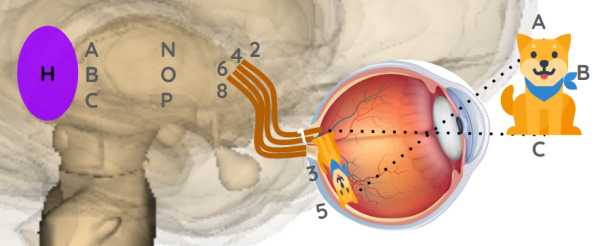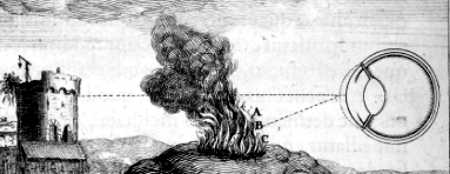Distance Perception
Table of Contents
Distance perception is determined by the position of the points on the pineal gland relative to the center of the brain. They refer to:
- closer locations as they move further away from the center of the brain
O[and go with the original position of the pineal gland] - farther locations as they move closer to that center [and farther from the original position of the pineal gland]
For instance, if point B moves backward, it would correspond to a more distant location than B.
Conversely, if it tilted slightly forward, it would correspond to a closer location.

This means that the soul could sometimes perceive different objects using the same organs arranged in the same way if the position of the pineal gland changes.
In conclusion, memory operates through the impressions left in the brain by prior experiences.
This enables past events to resurface in thought purely by chance, even when no external stimuli directly provokes recall.
This mechanism also explains how new combinations of ideas, such as chimeras and fantastical creatures, are formed in the imagination of those who, while awake, indulge in unrestrained flights of fancy without external distractions.

They are more distant.
For example, if point B had moved back a little, it would refer to a more remote place than B.
But if it were a little more inclined towards the anterior part, it would refer to a closer place. This is why the soul can sometimes perceive different objects with the same organs, arranged in the same way, although nothing is changed except the position of gland H.
For example, the soul may perceive what is at point l, by holding two sticks N L and O L with two hands.
Since spirits emanate from point l of gland H, tending to 7 and 8, to which those two hands respond.
But if this gland H were still closer, so that points n and o were in places marked I, K, and consequently spirits had emanated from them, tending to 7 and 8, the soul should perceive what is at N and O, by the same hands, also not changed at all.
However, when gland H is inclined towards some part solely by the force of the spirits, the rational soul and external senses contribute nothing to the production of ideas formed on the surface of the gland. Ideas then arise from:
- the inequalities of the spirits, which consist of the particular ones mutually encountering each other, and
- traces of memory
When the distinctive shape of an object is impressed on a part of the brain more distinctly than any other, the gland accurately inclines to it.
- The spirits tending towards it then receive the impression.
- This is why past things sometimes return to thought merely by chance, even if memory is not much excited by any object that strikes the senses.
But if, as often happens, more and different figures are found almost equally perfectly impressed on the same part of the brain, the spirits will receive something from the impression of each, more or less, as their particles come upon them differently.
Thus, in this way chimeras and hippogriffs are created in the imagination of people who dream while awake. They let loose their imagination through laziness, not diverted by any external objects, nor governed by reason.
But the effect of memory, whose examination is here of greater utility, consists in this, that this machine, even though no soul exists in it, can nevertheless be naturally arranged so that it can imitate the motions of true men, or other similar things that are present to it.
Another cause that can determine the motion of gland H is the action of objects on the senses that occur.
The first effect is that when the entrances of the tubes 2, 4, 6, 8 are dilated, the action of objects A, B, C, the spirits, which immediately begin to flow more freely and vigorously towards them than before, attract that gland a little after themselves: which if it were not hindered from elsewhere, would become more inclined.
By changing the arrangement of its pores, it would emit more spirits through a, b, c, to 2, 4, 6, 8 than before.
This renders the idea formed by those spirits so much more perfect.
The pineal gland can also be held inclined in some way that hinders it from receiving ideas of objects.
For example, the spirits emanate from points a, b, c from gland H. They do not sufficiently emanate from point d to form the idea of object D.
Hence, the action is not as lively, nor as effective, as from a, b, c.
This means that the ideas interfere with each other. Therefore, the more senses are involved, the weaker is each one individually.
Whenever the sense-organs are affected more strongly by this than by that, not yet accurately disposed to receive that action, the presence of that object alone is sufficient to complete that disposition.
For example, Fire A, B, C is very close to the eye.
- If the eye looks at a very remote place, when the fire presents itself, the light of this fire can cause it to be immediately arranged to be looked at with a fixed gaze.
